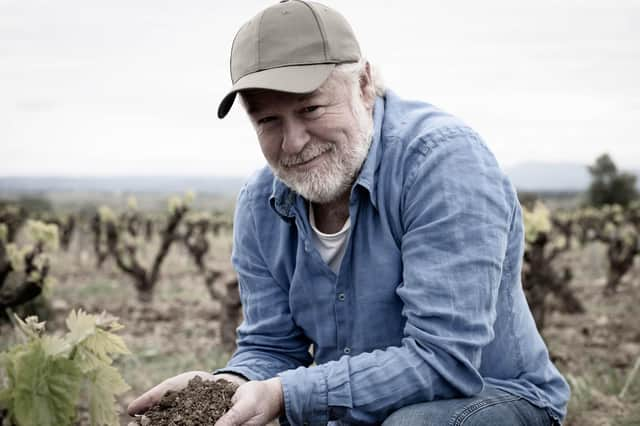Wine producers and drinkers have a part to play to help protect the environment


In short, have you done all you can for the environment, while still having a good time?
Ignoring the virus crisis for just a moment, there is still a climate crisis heading our way. Higher sea levels and increasing temperatures, fires, storms and floods are all part of the climate debate.
Advertisement
Hide AdAdvertisement
Hide AdSo, before the enthusiasm for New Year resolutions fades completely, what can wine drinkers do to help in the battle against climate change? All those usual resolutions such as losing those Christmas pounds and learning a language can wait, but climate change is with us, so we should do what we can to slow its progress.


Recycle
Glass is the most used packaging for wine and because it is endlessly recyclable it is an environmentally-friendly way of buying wine – to a point. Glass foundries use very high temperatures, they are never switched off and not all wine-producing countries have their own. Those producers have to import glass from far-off countries, fill the bottles and export, which means that both empty and full bottles are sailing across oceans, wasting energy.
Some producers use heavyweight bottles to imply that the wine is good quality but most of the time that is just a trick. Lightweight bottles mean that it comes from a responsible producer; heavy bottles often come from producers who put their own marketing aims ahead of the needs of the rest of the world.
If you can buy wine that has travelled the seas in large flexi tanks, and then been bottled in one of the UK’s superb bottling plants, the carbon saving is huge. Check the back label to find out where your wine was bottled.
Advertisement
Hide AdAdvertisement
Hide AdWhen you have finished your wine, recycle the bottle to keep the carbon footprint down.
Other forms of packaging are becoming more popular. There is work on a plastic-lined paper bottle, while bag-in-box wine is very economical to move around the world, although the plastic bag inside does have recycling problems at present. Wine in cans is very sustainable since it is cheap to move around and totally recyclable.
Cork v screw-cap
Ever since aluminium caps came into widespread use, I have championed them. They are easy to use and keep the wine in tip-top condition. When you have finished the bottle, throw the cap into metal recycling.
The part that remains on the bottle will be removed when the glass is recycled.
Advertisement
Hide AdAdvertisement
Hide AdBut cork has a distinct advantage over screw-caps. Cork trees grow in Portugal and Spain, and they can live for centuries. Every 10 years or so they are stripped of their bark which is used for stoppering bottles, insulation and household items.
The cork regrows and the tree actually absorbs more carbon if it is regularly stripped in this way. The forests in Portugal absorb around four million tonnes of carbon dioxide every year, which is more than all the cars in Yorkshire emit each year.
Majestic wine is collecting corks to be recycled for use at the Eden Project.
Growing grapes and making wine
Vineyards and wineries are generally energy-hungry places. Vines need to be sprayed, fermenting wine needs to be cooled and wineries need to be washed down regularly. But there are so many ways of working sustainably.
Advertisement
Hide AdAdvertisement
Hide AdSolar panels, electric vehicles and water recycling are all projects which can save energy and many companies are now regarding sustainability as an important factor in the way that their wines are viewed. New Zealand has one of the most comprehensive sustainability programmes. Look for the fern leaf sustainable logo on the back label.
To help you navigate the wine shelves and find wines that both taste good and are kind to the world, here are some suggestions.
Hidden Sea of South Australia
This company is committed to removing discarded plastic bottles from the sea. For every bottle sold, it will remove 10 plastic bottles that have been floating around. Hidden Sea is linked to ReSea, which verifies that waste has been collected from the oceans and recycled to be used again.
Hidden Sea wines – Chardonnay, Sauvignon Blanc, Rose and Shiraz are all good drinking wines. I prefer the smooth, rounded Chardonnay and the red-fruited Shiraz. They are available in Asda, Sainsbury’s and the Co-op, at between £7 and £9 depending on offers.
Ch. Maris
Advertisement
Hide AdAdvertisement
Hide AdGiven that Europe is home to some of the world’s largest and well-financed companies, it is astonishing that the first certified B Corp winery is owned by British ex-pat Bertie Eden. B Corp identifies environmentally, ethically and socially aware companies.
Ch. Maris is in the best part of the Minervois in southern France where Bertie uses biodynamic methods for his vines. His winery is made of blocks of hemp and lime, and he uses a horse in the vineyard, not a tractor.
Try the dark, spiced-edged flavours of Ch. Maris Vieilles Vignes Organic Minervois, 2020, Waitrose, £10.99.
Purato, Sicily
Sicily’s wines have improved dramatically and Stefano Girelli has been part of that transformation. He makes vegan, organic wines from local grapes, and packs them in bottles made from 80% recycled glass. The winery is carbon neutral.
Advertisement
Hide AdAdvertisement
Hide AdTry the smooth, silky Purato Nero d’Avola 2020, which is packed with dark red fruits, available from Ocado at £7.99.
17 Trees
Australia is planning to plant 25 million trees to aid bushfire recovery. As part of that initiative, wine company De Bortoli will plant a tree for every six bottles of 17 Trees wine sold.
Try De Bortoli 17 Trees Pinot Grigio 2020, Waitrose, £9.99, for its clean, pear-infused, citrus flavours.
